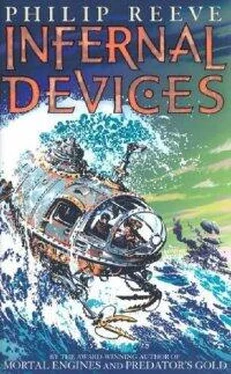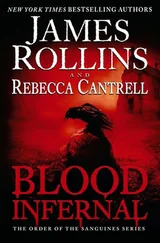“Oh yes, Mr. Shkin,” said Fishcake with his mouth full.
Shkin smiled at him over the tips of his steepled fingers. “Good. Very good,” he said. “You know, boy, every now and then I acquire a slave who proves too useful or too bright to part with; Miss Weems, for example. I hope that you will be another.”
Fishcake nervously returned the smile. “You mean you ain’t going to sell me off to them Nuevo-Mayan devils, sir?”
“No, no, no, no,” Shkin assured him, shaking his head. “I want you to serve me, Fishcake. We’ll have you trained up as an apprentice. And next summer, when the weather improves, I shall outfit an expedition, and you will lead us to Anchorage-in-Vineland. I imagine those Vinelanders or Anchorites or whatever they call themselves will fetch a good price at the slave markets.”
Fishcake listened wide-eyed, then grinned. “Yes, Mr. Shkin! Thank you, Mr. Shkin!”
Shkin leaned back in his chair, his temper quite restored. He would avenge himself on Pennyroyal by showing the whole world that Anchorage had survived. As for that treacherous little vixen Wren, let her see how clever she felt when the Shkin Corporation enslaved all her family and friends.
Chapter 15
Children of the Deep
The limpet Screw Worm had been built long before the Lost Boys started to use wireless crab-cams. Even its radio set had stopped working long ago. It had no way of receiving the broadcasts from Brighton, and so Hester, Tom, and Freya never had to find out whether Caul’s desire to meet his parents would have outweighed his loyalty to his friends. Deaf to WOPCART’s invitations, the Screw Worm swam north into the deep, cold waters of the Greenland Trench. On the same late-summer afternoon that Wren came face-to-face with Pennyroyal, its passengers finally sighted Grimsby.
Tom had visited the underwater city once before, but Hester and Freya knew it only from his descriptions. They jostled for a view as Caul steered the limpet closer.
Grimsby had been a giant industrial raft once. Now it was a drowned wreck, resting on the slopes of an undersea mountain. Weeds and barnacles and rust were all working hard to camouflage it, blurring the outlines of buildings and paddle wheels until it was difficult to tell where Grimsby ended and the mountain began.
“Where are the lights?” asked Tom. His strongest memory of the Lost Boys’ lair was the surreal glow of lamplight in the windows of Grimsby’s sunken Town Hall. Now the whole city lay in darkness.
“Something’s wrong,” said Caul.
Something bumped against the Screw Worm’s hull. Shards of splintered wood and torn plastic revolved in the splay of light from the nose lantern. The limpet was swimming through a zone of drifting wreckage.
“The whole place is dead—” Hester said, and then stopped short, because if that was true, then Wren was probably dead as well.
“Look at the Burglarium!” Caul whispered, shocked. A big building slid by on the starboard side, a building where he had spent much of his childhood, now lightless and open to the sea, litter swirling around huge, jagged rents in its walls. A boy’s body turned slow somersaults as the Worm’s wake reached it. Others tumbled in the flooded glastic tunnel that had once linked the Burglarium to the Town Hall. “Power plant’s gone too,” he added as they passed over a domed building that had been smashed like an eggshell. His voice sounded tight and strained. “The Town Hall looks all right. Nobody about, though. I’ll see if we can get inside.”
It was sixteen years since Caul had fled this place, but he had made the approach to the limpet pens a thousand times in his dreams since then. He swung the Screw Worm toward I40 the water-door at the base of the Town Hall. The door stood open. Silvery fish were darting in and out.
“Still no one,” he said. “It should be closed. There should be sentry subs to check us out.”
“Maybe they’re trying to raise us on the radio and we can’t hear them,” Tom suggested hopefully.
“What do we do?” asked Freya.
“We go in, of course,” said Hester. She checked the gun in her belt, the knife in her boot. If there were any Lost Boys left alive in there, she meant to show them what Valentine’s daughter was made of.
The Screw Worm slid into the tunnels. Automatic doors opened ahead and closed behind. “The emergency power must be on,” said Caul. “That’s something…”
“It could be a trap,” said Hester. “They might be waiting for us.”
But no one was waiting for the Screw Worm. It surfaced in one of the moon-pools in the floor of the limpet pen, and its passengers scrambled out into cold, stale air. The darkness was broken only by a few dim red emergency lights. Air pumps wheezed asthmatically. The big space, which Tom remembered as being filled with Lost Boys and limpets, was deserted. Docking cranes stood mournfully above the empty moon-pools like the skeletons of dinosaurs in an abandoned museum. A fat cargo submarine wallowed in a dock on the far side of the pens, her hatches open. A half-dismantled limpet lay in a repair yard, but there was no sign of the mechanics who should have been working on her.
Tom fetched an electric lantern from the Screw Worm’s hold and went ahead, still trying to hope that he would find Wren here somewhere, alive and safe and running to hug him. He shone the lantern into the inky shadows under the cranes. Once or twice he thought he glimpsed a crab-cam scuttling away from the light. Nothing else moved.
“Where is everybody?” he whispered.
“Well, here’s one of them,” said Hester.
The big door at the back of the pens stood half open, and on the threshold lay a boy of Wren’s age, curled up, staring, dead. Hester pushed past Tom and stepped over the body. In the corridor outside the pens lay a half dozen more, some killed by sword thrusts, others by metal spears from harpoon guns.
“Looks like the Lost Boys have been fighting among themselves,” she said. “Nice of them to save us the trouble.”
Tom stepped gingerly over the dead boy and looked up. Cold drops of water pattered on his upturned face. “This place is leaking like a rusty tin can,” he murmured.
“Uncle will know how to fix it,” said Caul. The others turned to look at him, surprised by the confidence in his voice. He felt surprised by it himself. “Uncle built Grimsby,” he reminded them. “He made the first few rooms airtight and built the first limpet all on his own, without anyone to help him.” He nodded, fingering his neck. The old rope burns were still there, hard under his fingertips, reminders of how much he had feared and hated Uncle at the end. But before that, for a long time, he had loved him. Now that he was here again, and the Burglarium was a ruin and the Lost Boys gone, he found that the fear and the hate had gone as well and that only love was left. He remembered how safe he used to feel, curled up in his bunk while Uncle’s voice whispered from the ceiling speakers through the long night shift. The world had been simple then, and he had been happy.
“Uncle Knows Best,” he murmured.
A sudden movement in the shadows farther down the corridor made Hester swing her gun up. Freya grabbed her arm before she could shoot, and Tom yelled “Het, no!” The echoes of his voice went booming away, up staircases and down side passages, and the face that had been pinned for an instant in his lantern beam vanished as its owner darted backward into the shadows.
“It’s all right,” said Freya, moving past Hester, her hands held out in front of her. “We won’t hurt you.”
The darkness was suddenly full of soft footfalls, rustlings. Eyes glinted in the lantern light. Out from their hiding places the children of Grimsby came creeping, smudged white faces pale as petals. They were newbies, too young to take their places yet among the Lost Boys. A few were as old as nine or ten; most were much younger. They stared at their visitors with wide, scared eyes. One girl, older and bolder than the rest, came close to Freya and said, “Are you our mummies and daddies?”
Читать дальше












